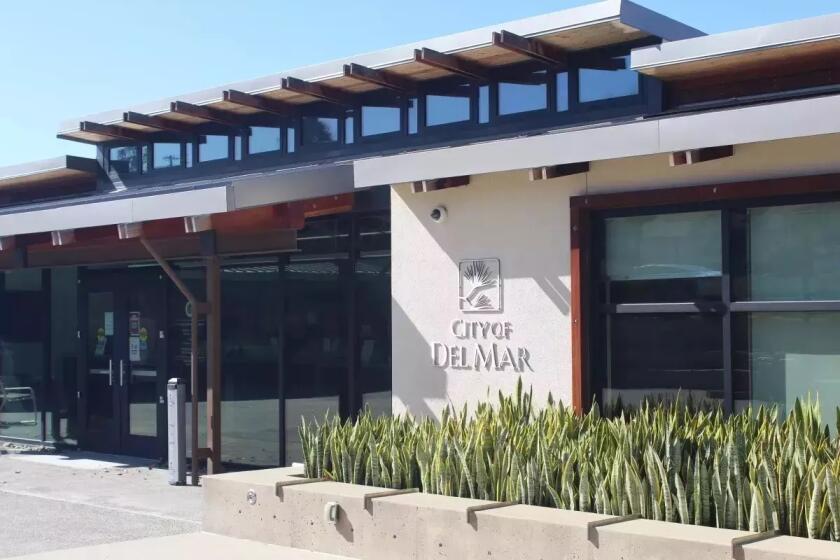Del Mar to fight for its short-term rental ordinance before Coastal Commission
A showdown over Del Mar’s short-term rental ordinance was scheduled for Thursday, June 7, before the California Coastal Commission.
The controversial ordinance, which was approved by the Del Mar City Council in November, restricts short-term vacation rentals in residential neighborhoods to a minimum period of seven days, for a maximum of 28 rental days per year.
The ordinance can’t take effect, however, until it is approved by the Coastal Commission and incorporated into Del Mar’s local coastal program. The commission’s staff is recommending that Del Mar’s ordinance be changed to allow minimum rental periods of three days, for a maximum of 180 days per calendar year.
At its meeting on Monday, June 4 (the first at Del Mar’s new civic center), the council voted 4-1 to ask the commission to approve the ordinance as submitted. The city sent a letter from Mayor Dwight Worden and a legal memo from City Attorney Leslie Devaney to the Coastal Commission Tuesday, June 5, supporting its position.
“I support going to the Coastal Commission and fighting for the plan we have before them,” said Councilwoman Ellie Haviland. The council voted 4-1 in favor of Haviland’s motion, which directed city staff to appear before the Coastal Commission and argue in favor of preserving Del Mar’s short-term rental ordinance as approved by the council.
Councilman Terry Sinnott, who voted against the ordinance last fall, cast the lone dissenting vote Monday, June 4.
“I really think our approach is the wrong approach,” said Sinnott, adding that the city could have addressed such problems as noise and litter through a system of permits for short-term rentals. “We’re going against the history of our community and we can solve the problem in another way.”
While vacation rentals have been around in Del Mar for decades, the issue came to a head in recent years with the rise of such online rental services as Airbnb and VRBO.
On one side of the issue are residents who say the short-term rentals are like mini-hotels that bring problems such as loud parties, trash strewn on yards and sidewalks, and a shortage of parking on their streets. On the other side are those who earn money through vacation rentals of homes and condos.
At Monday’s council meeting, about 10 people spoke, with a mix of those in favor of fighting for Del Mar’s ordinance as written, and those who support the Coastal Commission staff recommendation, or even more permissive regulations that would allow properties to be rented year-round, up to 365 days.
In its report, Coastal Commission staff noted that Del Mar has only six hotels, with a total of 355 rooms, to serve visitors. “STRs provide a significant supplement for visitor accommodations such that a severe restriction on the operation of STRs could have a significant adverse impact on promoting public access and visitor-serving opportunities.”
The report also said that STRs provide “a more affordable option for overnight stays on the coast, particularly for groups and families.”
In his letter, Worden said the city actually has 19 hotels, motels and timeshares within a five-mile radius (including the six in the city), along with 294 low-cost RV spaces. He contended that Del Mar provides many recreational opportunities for visitors, including free parks, tennis courts, beach parking, a dog beach, volleyball, surfing, swimming, hiking trails and summer concerts, and that some two million people visit city beaches each year.
“I challenge any town with a similar population around 4,200 to show they do more to accommodate coastal visitors,” Worden wrote.
He also wrote that average rental rates for short-term rentals in Del Mar are more expensive than in other communities, and that projects to develop new visitor accommodations in the city are in process.
In her 9-page legal memo, City Attorney Leslie Devaney wrote that the city’s ordinance provides a “reasonable, balanced approach” to protect residential neighborhoods and the city’s housing stock, while still providing visitor accommodations “where feasible.” The commission can only change the city’s ordinance to make it comply with Del Mar’s certified land use plan (LUP), which was previously approved by the commission, she wrote.
“It is not for the commission to assert its independent judgment to impose a different balance between these competing goals where the city’s balance is reasonable and in compliance with the LUP,” Devaney wrote.
Get the Del Mar Times in your inbox
Top stories from Carmel Valley, Del Mar and Solana Beach every Friday for free.
You may occasionally receive promotional content from the Del Mar Times.





